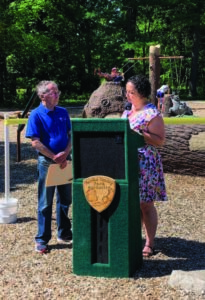
Long before she was a key part of the Washington Post team that won the 2016 Pulitzer Prize for National Reporting, Falls Church native and George Mason High School class of 2006 alum Jennifer Jenkins started her journalism career at 1430 S. West Street, where she created an email newsletter called the 1430 Post to cover the ongoings at the home she grew up in.
Jenkins, who is now a news researcher with the Post, said that there were no Watergate scandals at her house to report on – most of the articles were news briefs – and that she said she thinks her parents, Beverly Burke and Don Jenkins, were “really amused” by it. She was right.
“It was fun because it usually was pretty funny,” Burke said with a laugh. “And of course it was current for us at the time. We went through lots of things with our lives and she would put in her perspective, which was also good to know.”
Her creation of the email newsletter was an outgrowth of her being a “voracious reader,” as she recalled, as a child, which included reading the newspaper she currently works for cover-to-cover every day.
“I read to her before she knew how to read, every night. It was a religion for me,” Burke said.
“So [her] jumping to the Post was really not a stretch.” From that point on, Jenkins said, she has been a news junkie since she was a child. But she said that more than that influenced her to begin studying journalism and practicing it professionally at the University of Florida, where she worked for the student-run newspaper The Independent Florida Alligator and received a Bachelor’s degree in 2010.
“I’m a beltway kid. You’re aware of politics and local news. I mean, a lot of local news and D.C. goes national,” Jenkins said. “So you’re aware of all of this local news at a really early age and, in my case, one of my parents is a Republican and one is a Democrat, so I was exposed to a lot of political discussion at an early age.
“In general, I feel that people who have grown up in the D.C. area are pretty aware of news….But as far as how Falls Church specifically influenced me, I think it was the strength of the school system.”
Jenkins attended elementary, middle and high school at schools in the Falls Church City Public School system. She said she was a “pretty shy, bookish kid,” when she went Mason from 2002-2006, which is why journalism didn’t appeal to her initially.
“I didn’t think that speaking to people would be my strength,” said Jenkins, who didn’t write for The Lasso while she was at Mason.
“It’s partially the reason why I ended up in my current position because I feel like my strengths lie more in researching and fact-checking.”
But when Jenkins’ teachers at Mason saw that she had an interest in something, they would encourage her to pursue it. “In English or in history they would really push me,” Jenkins said. “And I think that made a really big difference.”
Brian Walsh was Jenkins’ eighth grade English teacher at what was then called George Mason Middle School and said he knew her as “Jenny.”
Walsh said that she was inquisitive in class, always had a book with her and gave insightful answers to questions that showed independent thought.
“She was studious. She was hardworking,” Walsh said. “She was quiet and her abilities were quite apparent, but she was often overshadowed because she was a quiet girl. In middle school when you’re quiet you get overlooked sometimes, but she worked hard and she was pleasant. She always had a smile on her face and always had a nice word to say. She was a good kid…so I was glad to see her making her way.”
Jenkins also credited the strength of Mason’s humanities classes with her pushing her into journalism. One of her favorite classes was Spanish. Kirsten Albert, who taught Spanish to Jenkins at Mason and was one of Jenkins’ neighbors in Falls Church, said that although Jenkins was a quiet student, “her inquisitiveness and her intelligence” was the loud part of who she was as a Mustang and that she isn’t surprised that she went into journalism.
“She’s always been passionate about writing and research,” Albert said. “And when she was a high school student she was in my Spanish III class and was already definitely demonstrating creative writing and really in-depth writing strengths, not only in English, but in Spanish as well.”
Burke said that she saw her daughter’s knack for research in the work she did for her homework assignments in grade school. “Whatever type of project she was working on she would find out every single little thing she could about it,” Burke said.
“[That] made her do well grade wise, but it also made her do well in finalizing what she wanted to do. We didn’t know what kind of research she would end up in, but I knew she would end up in some kind of research. She’s really systematic in how she does it and obviously she’s pretty good.”
Although Jenkins, who has been at the Post for five and a half years, won the Pulitzer Prize for National Reporting as part of a staff, a database named “Fatal Force” that she helped update was named specifically by the Pulitzer Prize board for why the staff won the award.
The Pulitzer Prize board said that the Post won the award “For its revelatory initiative in creating and using a national database to illustrate how often and why police shoot to kill and who the victims are most likely to be.”
The Fatal Force database, which was originally conceived of by Post reporter Wesley Lowery, keeps a record of the fatal police shootings in America and is the first of its kind in the country. Jenkins said that Ferguson, Mo. police officer Darren Wilson’s fatal shooting of Michael Brown in 2014, which sparked an uprising around the country, was part of the impetus for the creation of the database and the Post’s reporting on police shootings.
“[In 2014] you had the Michael Brown shooting and that ignited a huge debate about police shootings in America,” Jenkins said.
“So, while I don’t make the editorial decisions, I think the goal was to examine what police shootings look like in America because this was really an unknown universe. The FBI wasn’t keeping track of it and we weren’t sure if Michael Brown’s case was representative and we were just trying to collect as many as we could and see if we found patterns there.”
Jenkins said she and her colleague Julie Tate, another researcher at the Post, were “powering a lot of the stories” that came out of the Post’s Pulitzer Prize-winning reporting on police shootings in America. In addition to her work researching for the Post’s Metro desk, which is where she works when she’s not updating the Fatal Force database, Jenkins came in daily throughout 2015 to search for shootings to enter them into the database.
“Then there were periods where we would have to tabulate things that we had noticed or things that editors wanted to examine more closely and we were continually fact-checking the database as we went through this,” Jenkins said. “So it was quite the effort. It took quite a lot of time out of my day.”
Burke said that she saw her daughter doing a balancing act throughout 2015, managing her assignments from the Metro desk and her work on the Fatal Force shooting database, but said that the reporting that Jenkins and the Post’s team did was necessary work.
“I think it needed to be done because there was just no communication,” Burke said. “I think that [database] has been noticed by the FBI [and others], that there is a lack of communication between the various law enforcement agencies with their statistics.” Albert said that her personality lends itself to the type of work that she was doing and the subject matter she was covering in her research.
“You talk about such a potentially divisive topic with such emotion and such reaction…and she’s always been such a grounded force,” Albert said.
“And just to see the scope of the size of the team that worked on that is just remarkable to see her, so young, serving as kind of a grounding force, to be one of the ones who’s doing the tallying and the researching on such an emotional topic at this time. I think it speaks volumes to her maturity as an individual and her groundedness as an individual to be a part of that and to steer such a divisive topic into a cohesive reflection.”
Burke, her father Don, Walsh and Albert all expressed pride in Jenkins’ accomplishment. Jenkins said the Post’s reporting on police shootings and creation of the Fatal Force shooting database was a “huge effort.”
“We had editors, photographers, developers and graphic artists in on it, along with a huge number of reporters,” Jenkins said.
“It was an interesting process. I was happily surprised when we won it. I’m still fairly young….And I am completely honored that they thought our effort deserved a Pulitzer. It was very shocking for me and very exciting.”












